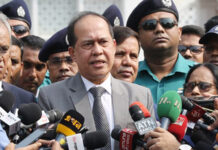No trust or interest in the election system

Election management and voters’ eagerness to cast their ballot had reached a height that continued from 1991 to 2014. At least, that is what the statistics say. Other than the February 1996 election, four elections to the national parliament were held in that span of time. Average voter turnout in these elections was 73.1 per cent. The February 1996 election to the 6th parliament voter turnout was 26.76 per cent only. BNP and 42 so-called parties took part in that election. The larger parties like Awami League, Jatiya Party and Jamaat-e-Islami boycotted it. Yet four months later when the seventh parliamentary polls took place, voter turnout shot up to 75.60 per cent.
The highest voter turnout out till date was 86.34 per cent and that was in the 2008 election. This election was held after almost right years with a lot of changes, for which the voters were so eager. The urban middle class was particularly enthusiastic.
The average number of voters of the two major political parties in the 2008 election was 48.04 per cent for Awami League and 32.50 per cent for BNP. Jatiya Party’s voters stood 7.04 per cent at and Jamaat’s at 4.70 per cent.
Like the February 1996 election, the 10th national parliament election was boycotted by many parties, including BNP and 153 candidates were elected uncontested. According to the election commission, the average vote count was 40.04 per cent and this was for the remaining 147 seats. The local an international media questioned these numbers.
Voters began losing their enthusiasm for elections from the 2014 polls, with the lack of participation of all parties, violence of the opposition and candidates winning uncontested. Then the voters were further frustrated with the local government elections from 2014 to 2018. These elections were marred with allegations of widespread rigging, irregularities, faulty management and the inert stand of the election commission.
And then voter interest was regenerated when all parties were to participate in the 11th parliamentary polls of 2018. They hoped for an inclusive and fair election. But that was not to be. The election was widely questioned at home and abroad and the impact of this will linger for long. The statement of the chief election commissioner himself, and of one of the commissioners, was a clear admission that ballot boxes had been stuffed on the night before the election.
The public also has doubts regarding the statistics of the 2018 election. According to the election commission, voter turnout over the entire country exceeded 80 per cent. Yet in five large cities and towns, the electronic voting machine (EVM) voter turnout rate was 51 per cent. This has given rise to questions. No one could explain why there was an almost 30 per cent decrease in votes in the EVM.
In this election, the ruling party secured 76.44 per cent of the voted and the main opposition party BNP 12.33 per cent. In the first election, held in 1973, Awami League under Bangabandhu’s leadership cinched almost 74 per cent of the votes. For the first time in the election history of Bangladesh, over 100 per cent of the defeated candidates will lose their security deposit.
After the parliamentary polls, the elections to the Dhaka North City Corporation were held in which the voter turnout was 31 per cent, according to the election commission. But the media gave a different story. In many centres hardly 10 votes were even cast.
After that, the first and second phase of the upazila elections hardly saw significant voter turnout. This was a one-sided election, particular in the post of chairman. There were ballot boxes stuffed on the night before the election and the election commission intervened. The commission and the law enforcement were relatively more active in this election. During the parliamentary polls the election commission was virtually inactive. This is how, from the 2014 election onwards, voters steadily lost their enthusiasm.
It had been hoped that things would improve with the 2018 election. However, things turned worse. The four city corporation elections were a disappointment. The election commission admits that voter turnout has decreased. But unless it can rectify the weaknesses in its management, it will be difficult to restore voter confidence.
There are various reasons for waning voter interest in any election. There are all sorts of views about this in the west. Voting has been made compulsory in many countries there. But the reason for their low voter turnout and ours is not the same. In our country, voting has always been a festive occasion until recent times when it has become dismal.
It is not simply the absence of a large political party that has dampened the voters’ spirits, though that is what the chief election commission maintains. It may be a significant reason, but why would there be such a sudden drop to 30 per cent voter turnout in the Dhaka North City Corporation polls after an 80 per cent turnout in the national parliamentary poll held just two months earlier? And the question arises further as not only opposition voters abstained from voting, so did the supports of the government.
In counties like ours, voters lose interest when a voter faces obstructions to vote, when extensive rigging changes the results and the opposition and its voters are harassed. Also, there is the ineffective election management, the law is not enforced, a level playing field is not ensured and the environment is not conducive to fair elections.
Hopes in the DUCSU election were defused for the same reason. The DUCSU election was held after 28 years, but only 60 per cent of the voters turned up. The mismanagement was clearly visible.
The foundation of our democracy is weak. If people lose all confidence and interest in election management and the election, this will hit democracy hard.
* M Sakhawat Hossain is a former election commissioner, retired defence officer and presently honorary fellow at NSU. This piece appeared in Bangla in Prothom Alo print and has been rewritten in English by Ayesha Kabir









